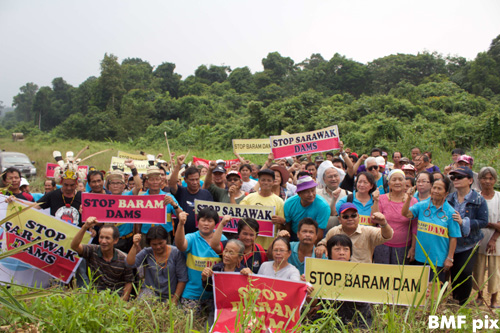Indigenous anti-dam activists from around the world have gathered in Baram, Sarawak, in light of the two-year anniversary celebration of blockades against the proposed Baram Dam.
Last Friday, the communities, from Malaysia, Indonesia, the Philippines, Cambodia, Brazil, the US and Honduras gathered on the banks of the Baram River and adopted a declaration.
The declaration acknowledges the widespread suffering and destruction caused by dams and stresses the importance of obtaining free, prior and informed consent from communities impacted by the building of dams.
 “It urges all stakeholders to act in full accountability, transparency, and compliance of all human rights principals and values,” SAVE Rivers, JOAS, BRIMAS, The Borneo Project and Bruno Manser Fund said in a joint statement.
“It urges all stakeholders to act in full accountability, transparency, and compliance of all human rights principals and values,” SAVE Rivers, JOAS, BRIMAS, The Borneo Project and Bruno Manser Fund said in a joint statement.
“The declaration also calls on governments and institutions to stop presenting dams as climate neutral and to recognise that dams emit large amounts of greenhouse gases, including methane.”
The week-long event is called the World Indigenous Summit on Environment and Rivers, or Wiser Baram 2015, and is hosted by the grassroots network SAVE Rivers.
Work on dam at a standstill now
Indigenous communities set up the two blockades two years ago and chased workers and researchers from the site.
Work on the dam has come to a standstill and last month the Sarawak government announced a moratorium on the multi-billion ringgit project.
Meanwhile, participants at the week-long event were also united by the similarities among their struggles.
“I have gained a lot of experience from all of the delegates. And with such information, I am confident enough that such experiences will be fundamental to us - the Baram People - and our strategies to continue to fight and stop the proposed Baram Dam,” said James Nyurang, who hosted the delegates at his village.
According to Berta Cáceres, 2015 Goldman Prize winner from Honduras, “This summit on indigenous peoples and rivers has a special value in that its actions give strength to the historic resistance of our peoples and makes visible the grave aggressions and conflict generated by the privatisation of rivers and the construction of dams within Indigenous communities and regions.”

